It has been a uniquely challenging year, even by the standards of Myanmar’s recent history. The global COVID-19 pandemic has not spared the country, and while the toll has been severe—Myanmar ranks third in ASEAN for cases and deaths—the most dire predictions have not come to pass, thanks to the heroic efforts of the nation’s doctors, nurses and volunteer health workers, who have worked tirelessly and at great personal risk to ensure that every patient receives free hospital treatment and that the country’s quarantine centers continue to function. The nation’s stretched medical resources have been calmly and capably deployed by Health Minister Dr. Myint Htwe and State Counselor Daw Aung San Suu Kyi, and crucially supplemented by the donations of Myanmar citizens, rich and poor. The nation’s economic ministries rose to the complex challenges posed by the pandemic, moving quickly to secure external assistance while drawing up plans to cushion the blow as much as possible at home.
The arrival of the pandemic during an election year could not quell the Myanmar people’s desire to participate in the democratic process by voting. Troubling incidents of election violence marred the pre- and post-election periods, including the assassination of a newly elected Upper House MP from Shan State. Thanks to the efforts of thousands of poll workers, however, election day itself went smoothly, with election monitors adjudging the vote free, fair and largely safe despite surging COVID-19 numbers. Their efforts were courageous—and at times thankless, with the military-proxy Union Solidarity and Development Party (USDP) at one point blaming polling station staff for its second consecutive landslide election defeat to the National League for Democracy. The claim was met with derision.
The USDP’s defeat raised interesting questions for the Myanmar military chief, Senior General Min Aung Hlaing, whose political ambitions took a blow. All eyes will be on his relationship with the State Counselor in the coming months and (should he decide to stay in the top military job) years, not least because of a surprise informal suspension in hostilities between the Tatmadaw and Arakan Army in Rakine State, brokered with the help of Japan.
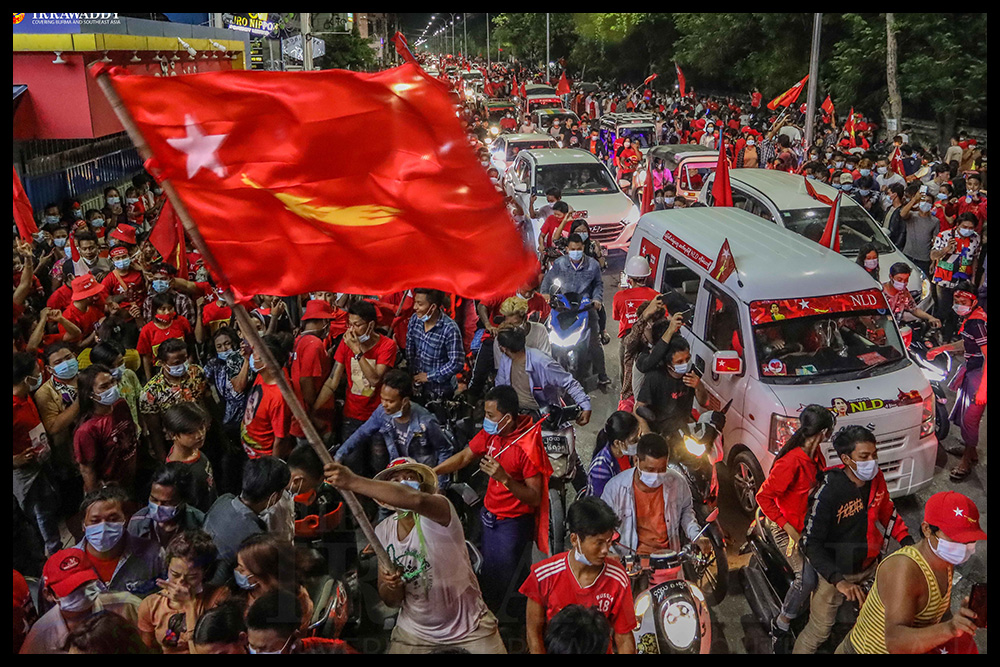
The People of Myanmar: A politically aware citizenry
When it comes to whom they want to lead the country, the people of Myanmar are decisive and determined. Take the past two elections. Five years on from the 2015 poll, voters’ attitudes have barely changed. Nothing—not even COVID-19—could deter them from flocking to polling stations across the country on Nov. 8. The majority of them wholeheartedly cast their votes for Daw Aung San Suu Kyi’s ruling National League for Democracy so as to keep the country’s development moving forward for the next five years, bringing the party another landslide victory; they don’t trust anyone else to do the job. This doesn’t mean they are completely happy with the NLD government’s performance over the past four and a half years. But given their decades-long personal experience of living under the regimes of the military and its associates, they seek someone who is sincerely dedicated to the country and the people. They are also aware that voting against anyone with ties to the former regime is the only way to ensure the bad guys don’t return, and to keep the country’s fledgling democracy alive. So, they grabbed their face masks and ventured out to perform their civic duty and cast their votes. — By Kyaw Phyo Tha
—————————————————————-
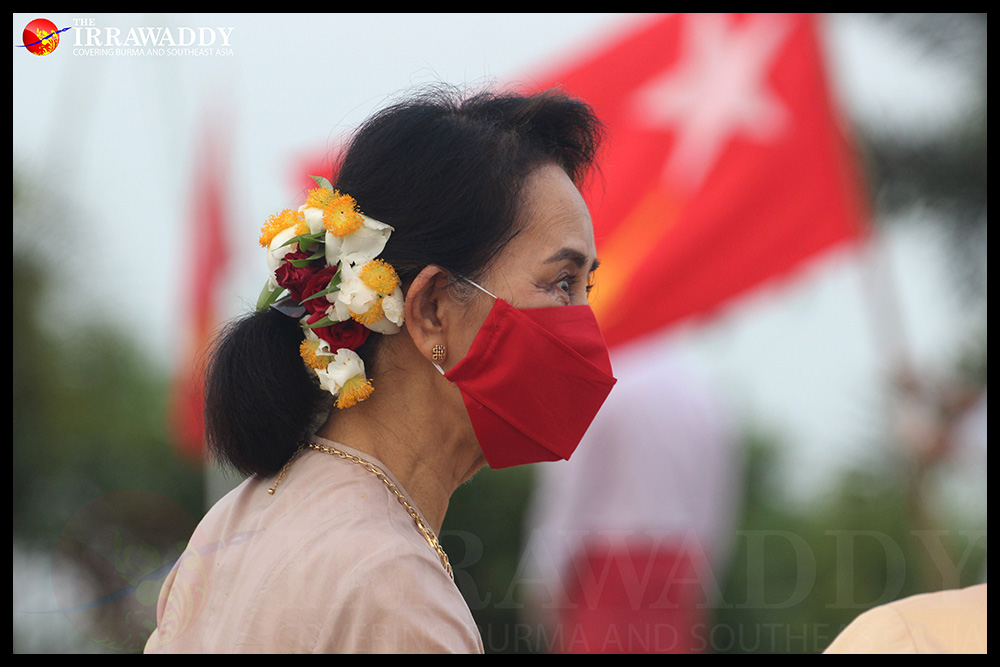
Daw Aung San Suu Kyi: The people’s leader in hard times
As Myanmar’s de facto leader, 2020 has probably been the hardest year yet for Daw Aung San Suu Kyi. Governments everywhere are struggling with the raging COVID-19 pandemic, but developing Myanmar, unsurprisingly, has suffered more than many. Budgets earmarked for development have been diverted into prevention and treatment measures for the pandemic, which has infected 108,342 people in Myanmar so far. Lockdowns and restrictions have taken a heavy toll on the economy, and the country’s long-neglected health system has been pushed to the brink of collapse. However, the 75-year-old State Counselor has remained optimistic throughout. As the leader of the Union-level response committee, she put the country’s Health Ministry in COVID-19 alert mode in early January and vowed that no one would be left behind; free treatment has been provided to all COVID-19 patients with the help of partners. In her weekly updates to the people, she has offered soothing messages, urging people to neither panic nor downplay the virus, while warning them to strictly follow health guidelines, as public participation is the most essential factor in getting through the health crisis. Nine months on, while the disease has not yet been brought fully under control, Myanmar seems to be coping, with more than 80 percent of those infected recovering and the overall death rate standing at 2.09 percent as of Dec. 14. In the months leading up to the November polls, some of her political opponents attempted to criticize Daw Aung San Suu Kyi’s public health efforts as an attempt to manipulate the pandemic to win votes. But such claims never gained traction; a majority of Myanmar people believed she was doing precisely what a leader should do in such circumstances, and she and her National League for Democracy won the election with ease. — By Kyaw Phyo Tha
—————————————————
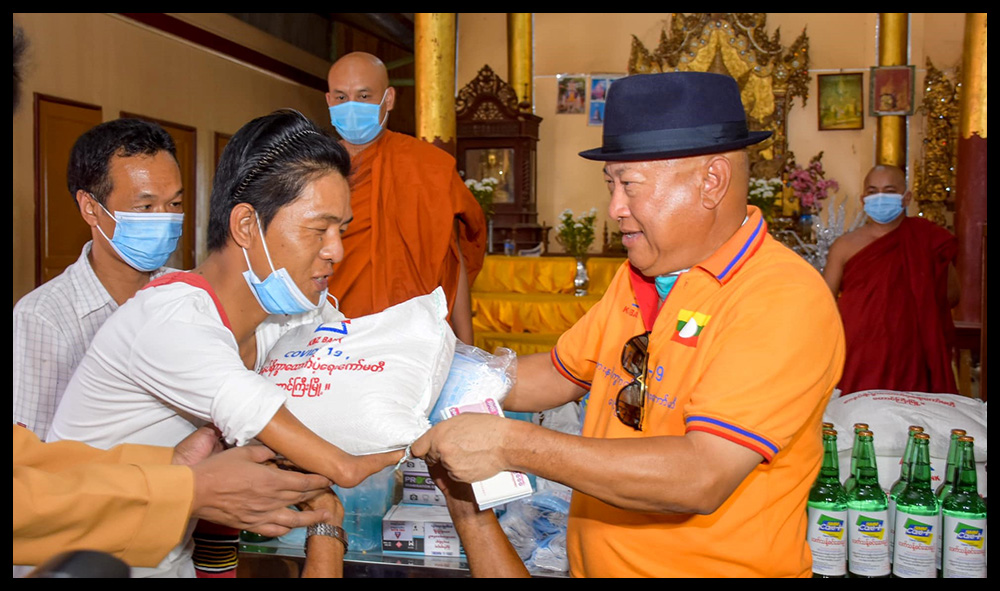
The Rich: Helping hands and deep pockets
It’s hard to see how Myanmar would have coped with COVID-19 were it not for the contributions made by civic-minded individuals. When the virus hit the country in March, State Counselor Daw Aung San Suu Kyi appealed for contributions from the public. Citizens at home and abroad responded with a flood of cash donations. And the rich weren’t going to be left out of this COVID-inspired national philanthropy movement.
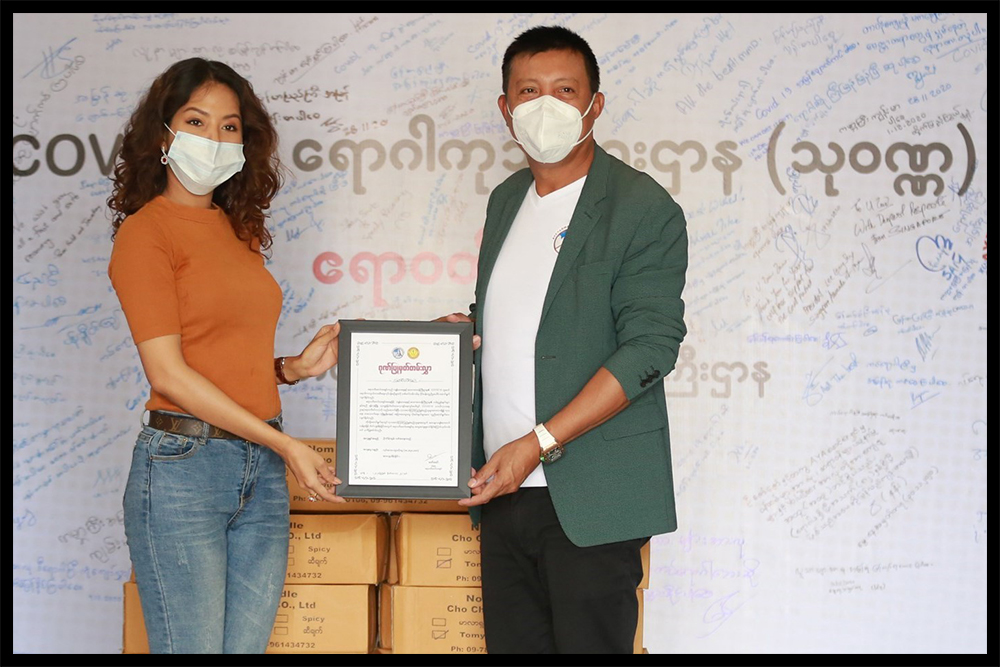
Leading the way are U Aung Ko Win of Kanbawza Bank (KBZ) and U Zaw Zaw of the Ayeyarwady Foundation; few have contributed as much to the pandemic response as they. So far, KBZ has contributed 11.2 billion kyats (US$8.2 million), and the Ayeyarwaddy Foundation 9 billion kyats. In late March, KBZ airlifted $1 million worth of hospital supplies and handed them over to the government. When Yangon was in urgent need of quarantine centers, U Zaw Zaw opened the doors of his AYA Bank’s training centers for use as self-isolation centers and provided those housed there with free meals from his Novotel Yangon Max. And when Yangon was hit hard by a second wave of the outbreak in late August and hospitals were running out of beds, both businessmen rushed to build temporary COVID-19 hospitals in Yangon and Mandalay to treat patients free of charge, showing by example that humanity still shines through in Myanmar, even in the tough times like the COVID-19 pandemic. — By Kyaw Phyo Tha
—————————————————
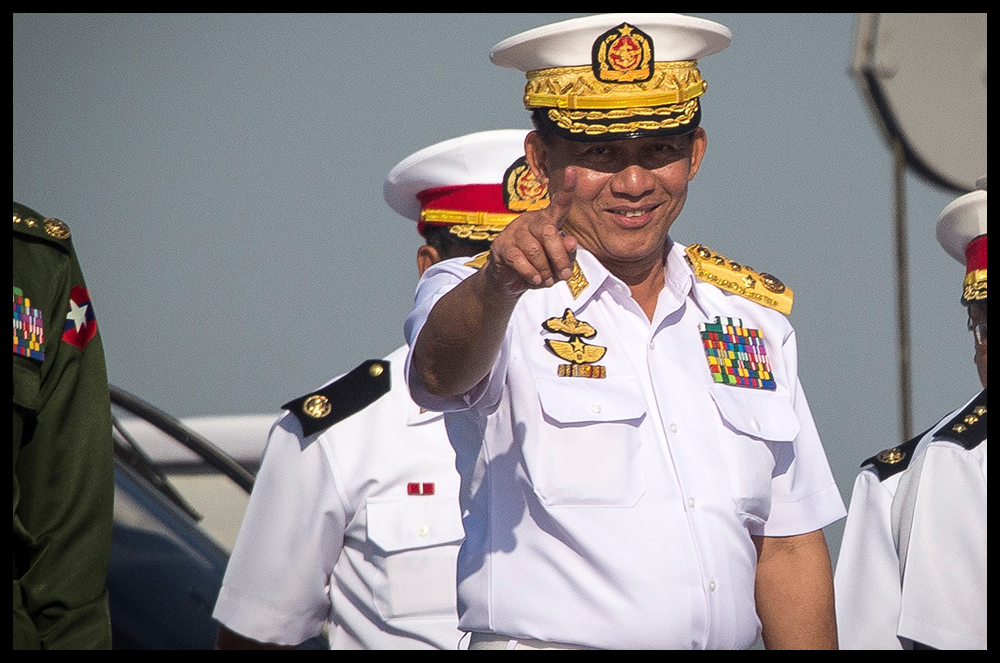
Military chief Snr-Gen Min Aung Hlaing: A year of ups and downs
2020 has been a year of mixed blessings for Myanmar military chief Senior General Min Aung Hlaing. He realized his longtime dream of acquiring a submarine for his navy (though not without controversy!) while making some upgrades to the air force fleet. At the risk of distancing himself from the Myanmar military’s one-time sole ally, China, he pursued warmer relations with his counterparts in India, Japan and Thailand. In the run-up to the election, he muddied the waters by questioning the legitimacy of the country’s electoral body, only to retreat on election day by saying he would respect the outcome. The landslide victory enjoyed by the National League for Democracy, led by his civilian rival Daw Aung San Suu Kyi, undoubtedly came as a blow, shattering his dream of taking the country’s highest political office with the help of the military’s proxy party. Well beyond the official retirement age of 60, the 64-year-old has so far shown no sign of relinquishing the job of commander-in-chief. Staying in the post would give him an opportunity to take the initiative to collaborate with the elected government on thawing the country’s going-nowhere peace process. How civil-military relations unfold in the coming years will determine Myanmar’s trajectory for the foreseeable future, as important issues like striking peace deals with ethnic armed groups and national reconciliation hinge upon them. — By Kyaw Phyo Tha
——————————————–
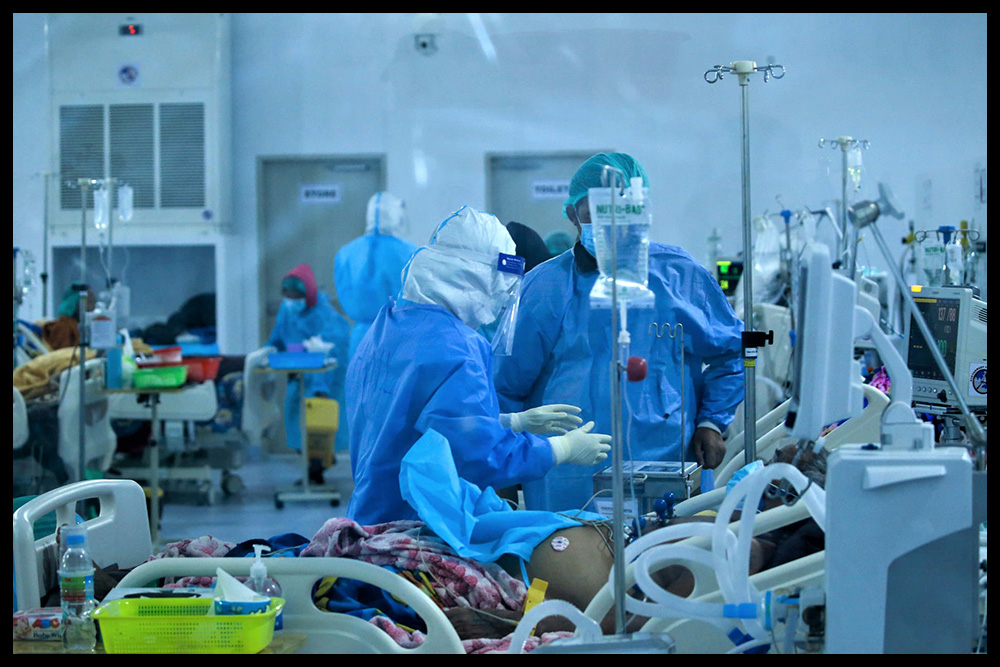
Doctors, Nurses and Volunteers: The heroes on COVID-19’s front line
Burdened with one of the world’s most under-resourced health-care systems, Myanmar’s fight against COVID-19 was always going to be difficult. Despite overwhelming odds, however, the country’s hospitals are still providing free treatment to all COVID-19 patients amid soaring infections, with more than 113,000 cases reported so far. Hundreds of thousands of people have been housed in facility quarantine centers and more than 1.5 million COVID-19 tests have been conducted. None of this would have been possible without the dedication and sacrifice of Myanmar’s limited supply of medical professionals and their indispensable support staff of volunteers.
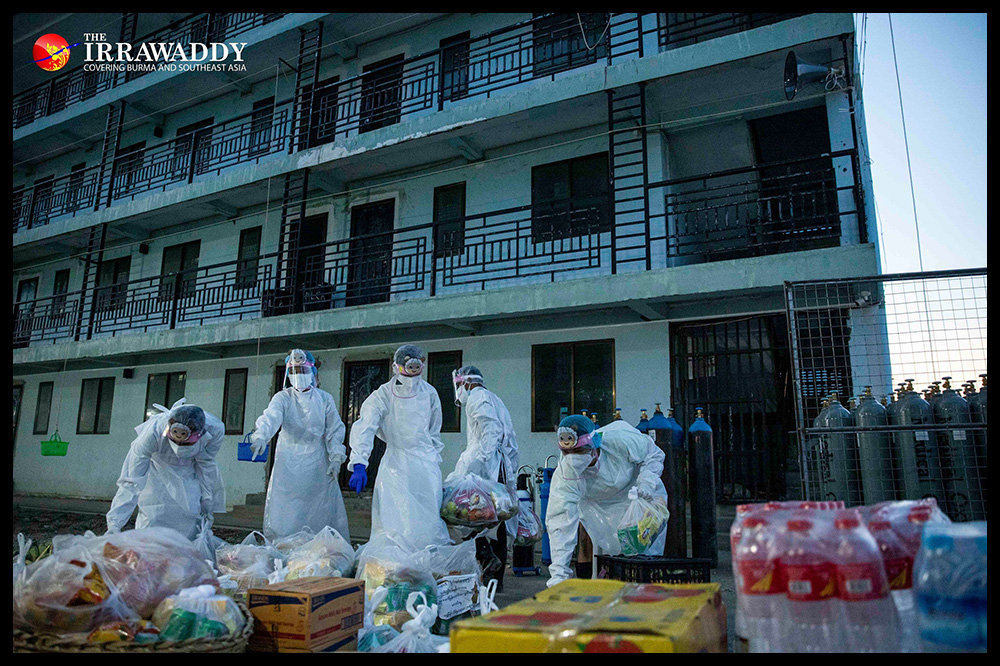
The fight has taken its toll; in Yangon, the nation’s COVID-19 hotspot, more than 500 medical workers have been infected with the coronavirus and two have died. Even infected medics have found a way to help, volunteering to help care for their fellow patients at COVID-19 centers while being treated.
Health Minister U Myint Htwe recently acknowledged that doctors and nurses are nearing exhaustion from their round-the-clock fight against COVID-19. Helping to make up the shortfall in human resources are thousands of volunteers working in quarantine facilities and COVID-19 centers at great personal risk, providing vital support by taking swab samples, disinfecting facilities, transporting patients to hospitals, and preparing meals and other necessities. — By Zaw Zaw Htwe
————————————————-
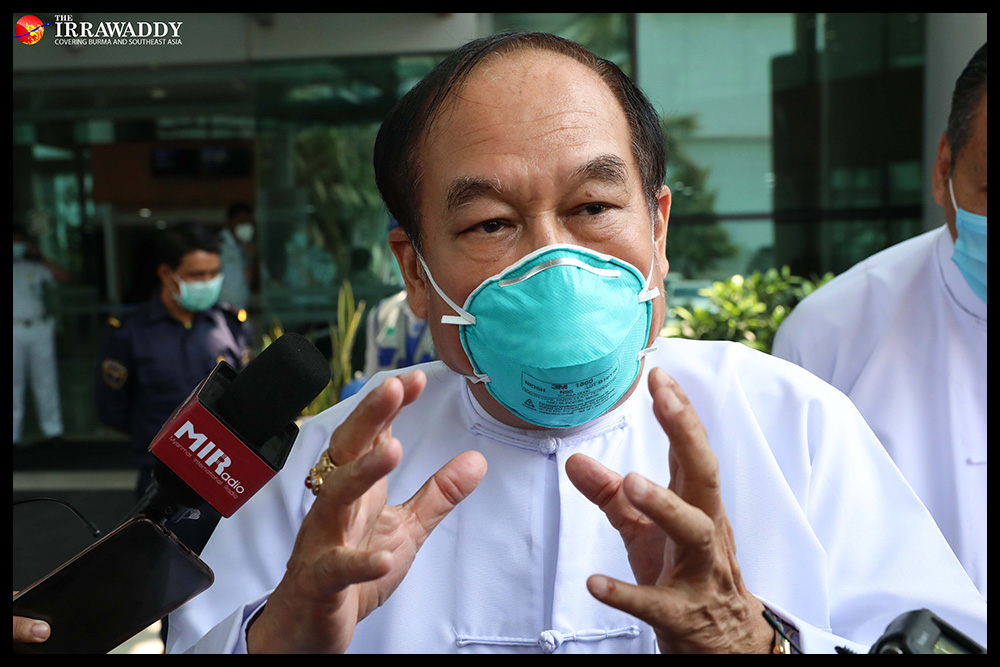
Health Minister Dr. Myint Htwe: Shouldering an awesome responsibility
This year has been hard for all of us. But few have faced a greater challenge than the one taken on by Health Minister Dr. Myint Htwe, who leads Myanmar’s fight against COVID-19. Making the most of the country’s limited resources and capacities, the hard-working minister and his staff have confronted a vast array of daunting tasks over the past nine months—including preparedness activities, surveillance, contact tracing, testing, treatment of COVID-19-positive patients and acquiring vaccines (which are expected to arrive in April)—with a high degree of success. He has been praised for his strong guidance and the leadership he has shown in coordinating the response to the crisis.
Yet he has not always received the support he needs; upset by the failure of the Yangon regional government to enforce the COVID-19 restrictions issued by his ministry, including stay- home orders, bans on large gatherings, and even a nighttime curfew in the country’s COVID-19 hotspot, the minister asked the chief minister to do more to enforce them, saying his medical staff were already exhausted, and the coronavirus would continue to spread unless people obeyed the rules. — By San Yamin Aung
————————————————-
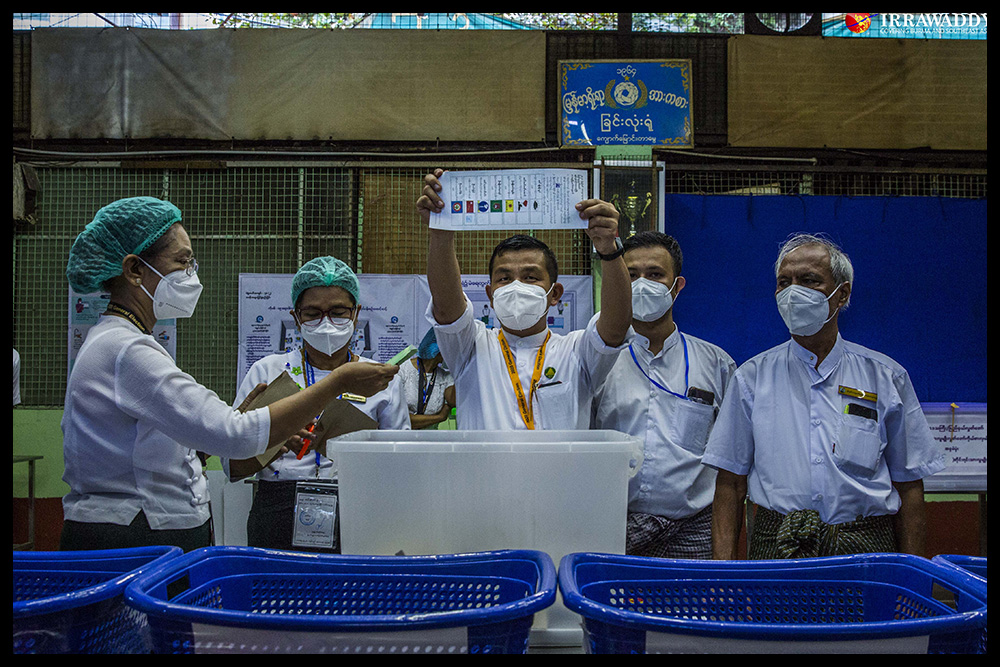
Polling Station Workers: Earning a nation’s gratitude
They are the unacknowledged heroes of Myanmar’s democracy: the army of workers who, on election day, Nov. 8, rose early to ensure that polling stations opened on time at 6 a.m.; saw to it that all voters were able to attend the stations and conveniently and safely cast their votes; carefully stained a finger of every voter to prevent fraud; and worked until late that night counting ballots, vigilantly ensuring that not a single vote was wasted.
They are Myanmar’s polling station officers and staff. Two-thirds of them (66 percent) were women. Their efforts to ensure that the country’s general election went off smoothly amid a surging COVID-19 epidemic were truly honorable and earned the nation’s gratitude. Election monitoring groups praised the COVID-19 preventive measures that were observed at polling stations and found no major irregularities in voting. The Yangon sub-election commission said that in Yangon alone, nearly 100 polling station staff contracted COVID-19, six of whom have died. The data for poll workers nationwide is unavailable. — By San Yamin Aung
—————————————————-

MOPFI and MIFER: Saviors of the economy
It has been a particularly hard year for the Ministry of Planning, Finance and Industry (MOPFI) and the Ministry of Investment and Foreign Economic Relations (MIFER), which have played vital roles in rescuing the embattled country’s economy from the pandemic.
Two weeks before Myanmar reported its first case of COVID-19, the government formed a central committee to tackle the impacts of coronavirus on the economy and set up a 100- billion-kyat (US$72.67-million) fund for affected businesses.
MOPFI launched a comprehensive, $2-billion COVID-19 Economic Relief Plan to help the country weather the pandemic’s economic and social impacts, with measures ranging from monetary reforms and increased spending to strengthening the health-care system. MOFPI coordinated with related ministries to make the plans a reality and sat down with international financial organizations to obtain nearly $2 billion in immediate financial support for the country’s COVID-19 response.
Notably, even as the coronavirus crisis flared, the MIFER continued to promote Myanmar to foreign investors through a series of virtual meetings. As a result, the country secured 98 percent of its FDI target for 2020—a major success given the economic disruption caused by the pandemic. It even found time to launch a second investment policy review to identify reforms needed to make the country a more attractive destination for quality, responsible investment. Meanwhile, the MOPFI is drafting a new, inclusive medium- to longer-term economic resilience and reform plan it hopes will invigorate Myanmar’s reform process even further. — By Nan Lwin
—————————————————–
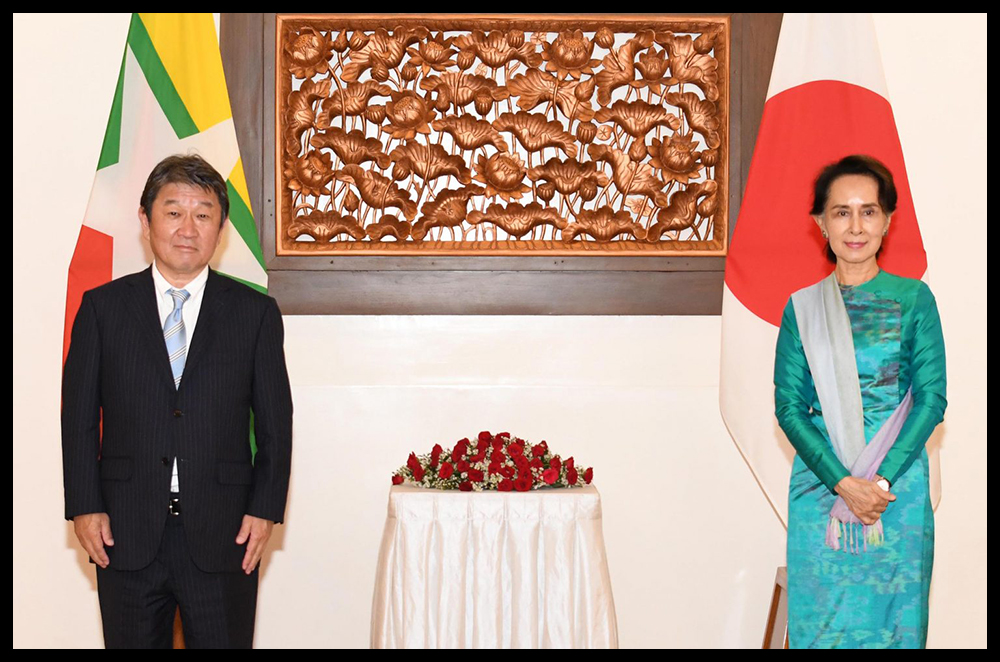
Japan: Myanmar’s most reliable friend in 2020
Japan has stood firmly by Myanmar amid the international condemnation directed at the country since the Rakhine crisis erupted. Myanmar’s largest official development assistance donor, Japan committed another US$1.1 billion (1.5 trillion kyats) this year for urban development, power distribution and other projects in seven regions and states including Yangon. To help small and medium-sized enterprises hit by COVID-19, Japan announced emergency low-interest loans worth 5 billion yen (66.1 billion kyats).
Japan was the first country to congratulate Daw Aung San Suu Kyi on her election victory. When international media accused Myanmar voters of blindly backing the National League for Democracy (NLD) due to the State Counselor’s personal popularity, Japan rejected the claim and vowed continued support to build a democratic nation.
Tokyo also committed to investing in the full phase implementation of the Dawei Special Economic Zone (SEZ) in southern Myanmar. The NLD had repeatedly sought official Japanese involvement to counter an expected increase in China’s presence in the Indian Ocean via the Kyaukphyu SEZ in Rakhine.
Yohei Sasakawa, Tokyo’s envoy for national reconciliation in Myanmar, helped to secure a temporary ceasefire between the Myanmar military and the Arakan Army (AA) after two and a half years of fierce clashes. After visiting the region, Sasakawa urged the Union Election Commission to hold voting where it had been canceled on Nov. 8. The halt in fighting has held, and the two sides even met in the Wa Self-Administered Zone’s capital, Panghsang, to discuss a formal ceasefire. — By Nan Lwin
—————————————-
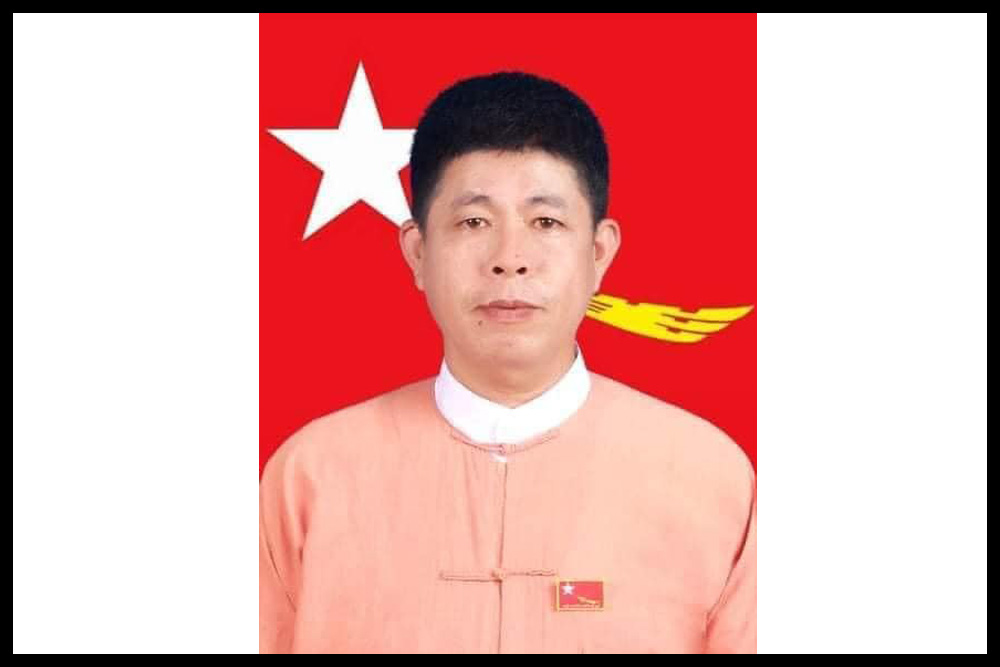
U Htike Zaw: Assassinated lawmaker
Violence associated with Myanmar’s 2020 election was among the worst on record. The campaign period and the weeks after the poll were marred by numerous acts of violence, culminating in the assassination of a newly elected MP in Shan State.
Supporters of the ruling National League for Democracy (NLD) and the military-backed Union Solidarity and Development party (USDP) clashed frequently during the campaign period.
Ruling party supporters’ property was damaged in a riot by a USDP mob in Mandalay Region and an NLD supporter was stabbed to death in a clash in Sagaing Region.
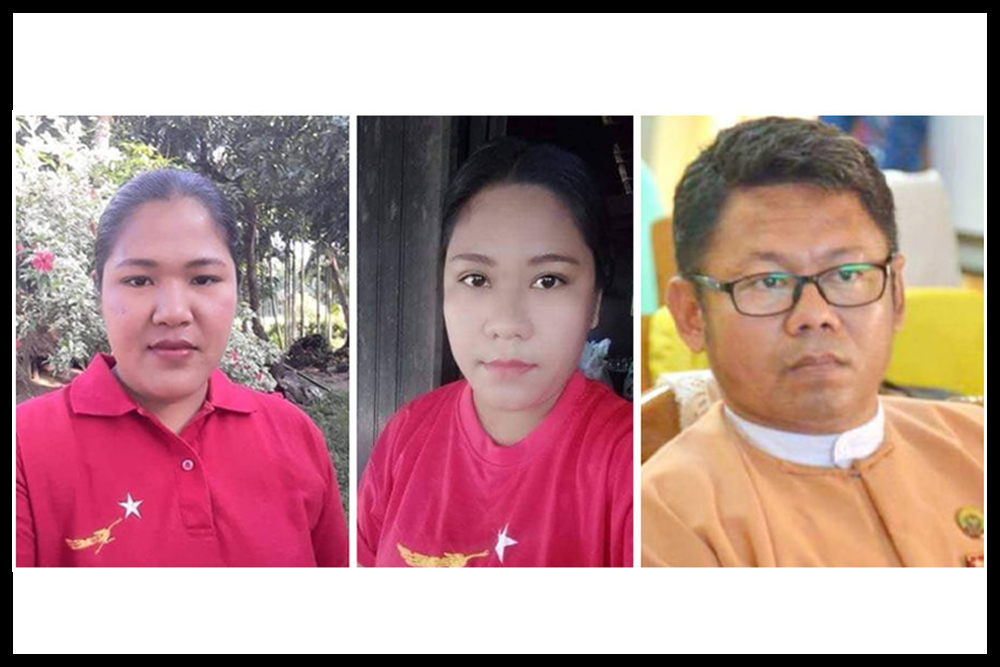
In other incidents, unexploded grenades were found at a Naypyitaw election official’s home and petrol bombs were thrown at an NLD member’s house in central Myanmar.
On Oct. 14, the Arakan Army abducted three NLD candidates in Rakhine State. All three remain in captivity.
In the worst act of violence, U Htike Zaw, a newly elected Upper House MP from the NLD in northern Shan State, was shot dead at his home in Pin Tain Village, Kyaukme Township, on Nov. 21, just 13 days after his win at the polls.
A week earlier, the house of Kyaukme’s election sub-commission chair was shot at.
Ethnic parties and some foreign diplomats condemned the assassination and called for those responsible to be brought to justice, but no one has yet been charged in the murder.
Following the assassination, the NLD urged supporters to be alert to the threat posed by those who oppose the peace process and moves toward a federal democracy. — By Zaw Zaw Htwe
—————————————————
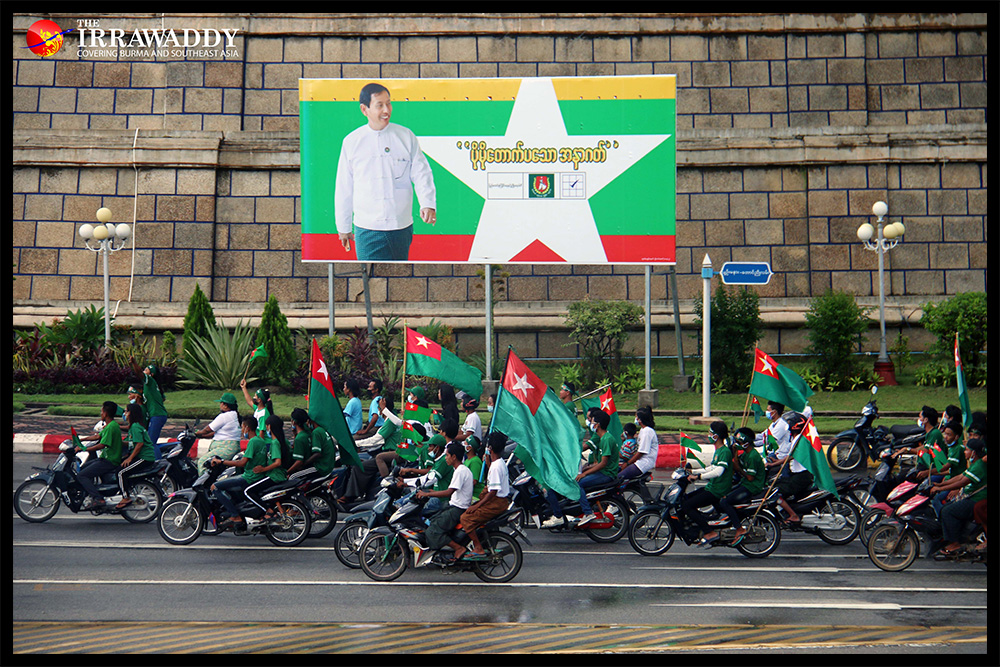
Foiled Again: The Union Solidarity and Development Party
One resounding election loss might be surmountable. But the implications of two straight landslide defeats are hard to ignore. That’s exactly the situation facing the leadership of Myanmar’s main opposition military-backed Union Solidarity and Development Party (USDP) in the wake of the Nov. 8 general election, which brought their second electoral humiliation in a row—the first was in 2015—at the hands of their rival, the National League for Democracy. When the election results showed their party had won a mere 71 of the 1,117 constituencies being contested, the USDP leadership found it hard to comprehend the scale of their defeat—or bring themselves to concede. Unable to grasp the new reality, the soldiers-turned politicians held a frenzied series of press conferences, claiming the vote was marred by electoral fraud and demanding a rerun of the election. To the voters’ amusement, they blamed everyone from the electoral body to journalists to polling station staff—even attributing their loss on allegedly pro-government schoolteachers manning the ballot boxes. Sadly for them, no one has taken their calls seriously. Due to its affiliation with the military, the USDP has rarely enjoyed popular support since its establishment under the former junta. They should now come to their senses and see that, after their double defeat, politics is not their cup of tea, and that they should try their luck somewhere else. Goodbye and good riddance! — By Kyaw Phyo Tha
———————————————-
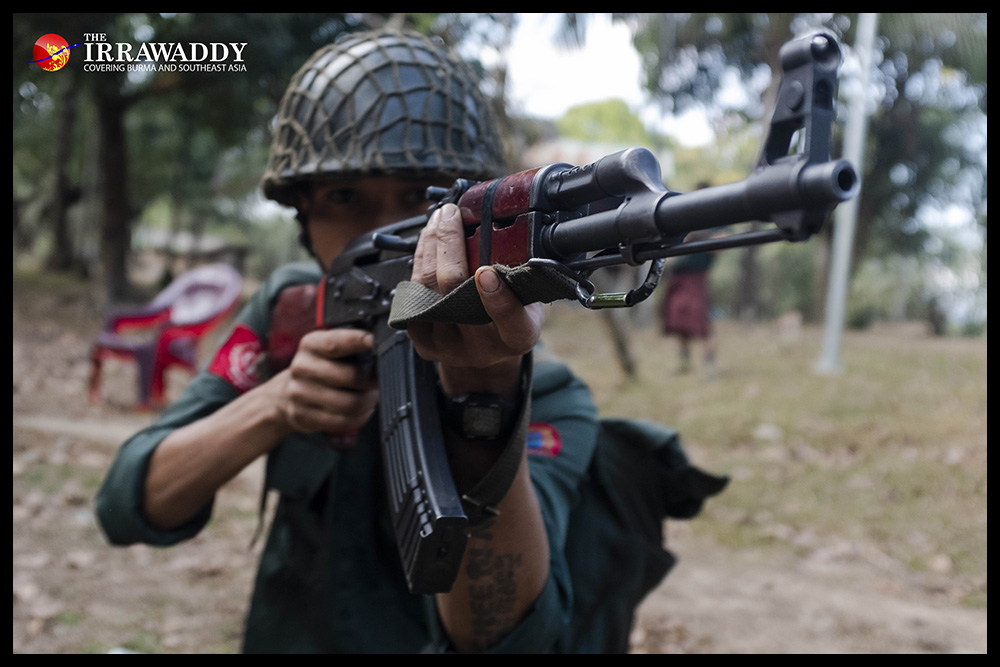
Arakan Army: After years of fighting, hope for peace
Throughout 2020, Myanmar’s most active ethnic armed group, the Arakan Army, fought fiercely with the military, until a breakthrough in November raised hopes for peace. Fighting between the military and the AA, which seeks self-determination for Rakhine State, had intensified steadily since November 2018. The fighting has displaced more than 230,000 people in northern Rakhine. Inevitably, civilians have been detained and killed. High-profile cases include the death of a local employee of the World Health Organization, whose vehicle was shot at while transporting swab samples from suspected COVID-19 patients (no one claimed responsibility); the AA’s arrest of NLD lawmakers and candidates, three of whom have been held since October; and the detention of Chin civilians accused of spying for the military. The NLD government declared the AA a terrorist group and an unlawful association in late March.
Citing the lack of security, the Union Election Commission canceled voting in nine whole townships in northern Rakhine in the November election. In a Nov. 12 statement, the AA urged the government to hold voting in the affected areas before the end of December and said it would collaborate with the military. To the surprise of many, the military welcomed the overture. The two sides have held informal talks twice to try to formalize the peace. Tens of thousands of IDPs have returned home since the fighting paused. — By Nyein Nyein
You may also like these stories:
Myanmar’s Movers and Shakers of 2019

















